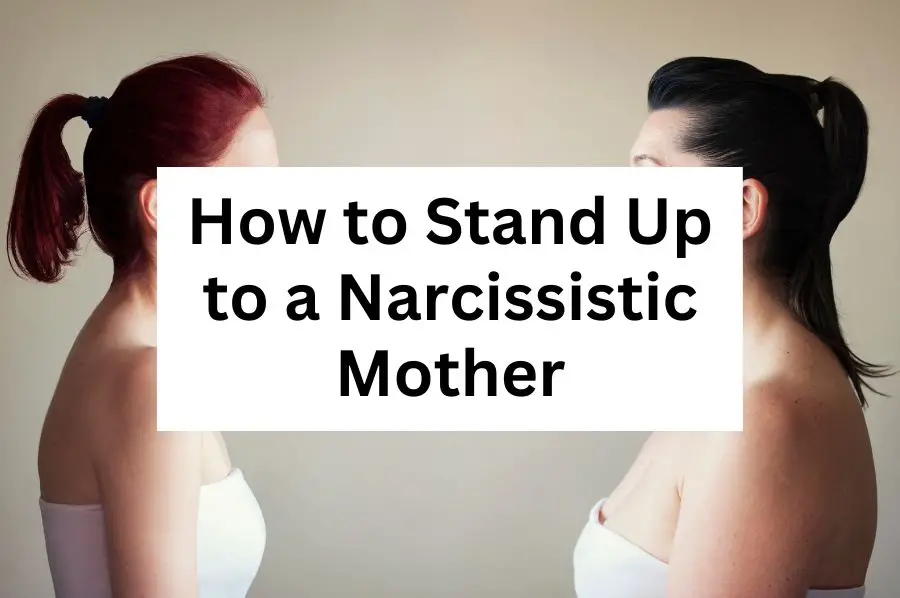How narcissists treat their parents can vary depending on the individual dynamics. However, just because it’s the narcissist’s mum or dad that we’re talking about, it doesn’t mean they will be any less narcissistic.
Narcissists often display specific behaviours and attitudes towards their parents that can be a mix of admiration, manipulation, exploitation and/ or total disregard.
Narcissists tend to view their parents similarly to their partner, siblings or children. To them, their parents are a mere extension of themselves or a means to fulfil their needs, rather than acknowledging them as individuals with their own emotions and desires.
Narcissists will always be self-serving because that is the way they are wired to operate beyond their childhood trauma. Whether they are fawning or fighting, you can bet it will always be because there’s something in it for them.
Let’s explore the variety of ways narcissists treat their parents.
This post may contain affiliate links. For more information, see our disclosures here.
How Do Narcissists Treat Their Parents?

Manipulate & Control Them
Narcissists will often manipulate their parents to get what they want, no matter how old they are.
The narcissist figures out pretty early on which strategies will work best to exploit either their Mum or Dad’s weaknesses and hone in on them.
They will guilt-trip their parents into making them feel responsible for their happiness or success. Or they may use threats or emotional manipulation on their parents to get whatever it is that they want.
“If you loved me, you’d do this for me.”
Narcissists are masters at casting themselves as the victim, exaggerating their suffering or challenges to extract sympathy from their parents. This manipulation technique aims to make their parents feel obligated to fulfil their needs.
A common tactic with how narcissists treat their parents is to exploit their mum or dad’s emotional vulnerabilities, using their knowledge of parental guilt, love or insecurities to manipulate them into meeting their demands.
They will also use threats or emotional manipulation on their parents to get their own way.
“If you don’t help me out, I won’t bother to come over and mow the lawns on the weekend.”
But, it’s not all bad, right? Sometimes narcissists can use excessive flattery, affection or charm to manipulate their parents into meeting their demands. They might turn on intense displays of love or admiration to pull at their parents’ heartstrings.
However, nothing comes for free with a narcissist.
They can easily alternate between being affectionate and then withdrawing that affection based on whether their parents comply with their wishes or not. This creates a cycle of reward and punishment to control their parents’ behaviour, much like a trauma bond.
This very tactic subtly shows that the narcissist’s love is conditional, implying that their affection is dependent on their parents meeting their demands or expectations.
It’s not just love and affection that the narcissist will withdraw. It might extend out to communication, money, security or support if their parents do not comply with their wishes. Their threats work to reinforce their control over their parents’ actions.
Narcissists couldn’t care less about how any of these tactics wear down and destroy their parents because, at the end of the day, it’s all about them.
| READ: What is a Trauma Bond? → |
Exploit Them

Narcissists are known to exploit their parents for personal gain, whether it’s financial support, using their resources, or seeking constant attention and validation.
The general theme of a narcissist is entitlement, and since they view their parents as extensions of themselves, they’ll feel extremely entitled to their parents in any capacity they so wish.
If there’s something in it for the narc, you can bet your bottom dollar they’ll be there with both hands out.
Examples of how narcissists exploit their parents:
- Financial Exploitation: Constantly asking for money, making unreasonable demands for financial support or expecting their parents to cover their expenses without paying them back.
- Living Off Parents: Living with them for an extended period without contributing to household expenses or responsibilities.
- Monopolising their Attention: Seeking constant attention, validation or praise from their parents, using emotional manipulation to maintain a spotlight on themselves while disregarding everybody else’s needs and feelings.
- Exploiting Health Issues: Exploiting their vulnerability (especially if their parents are unwell or elderly) by manipulating them into providing constant care or using their illness as leverage to get what they want.
- Taking Credit for Parents’ Achievements: Boast about their parents’ accomplishments or successes, using them as a means to elevate their own image or status, effectively riding off their parents’ coattails.
- Manipulating Family Dynamics: Pitting siblings or other relatives against their parents to create rifts that benefit their agenda. Manipulating the dynamics for their own gain.
- Pressuring for Control: Pressuring their parents into giving them control over family assets, property or decisions, exploiting their trust or emotions to gain power.
- Using Emotional Vulnerabilities: Using guilt or a strong sense of duty to manipulate their parents into giving them what they want.
- Neglecting Responsibilities: Leaving their parents to handle tasks or obligations that the narcissist should be managing, exploiting their parents’ availability or kindness.
Idealise & Devalue Them

Narcissists cycle through a pattern of idealisation and devaluation across many of their relationships, including with their parents. It’s the trademark push-pull dynamic of the narcissist, which they use to control and manipulate people and situations around them.
Idealisation
Here’s what idealisation can look like with the narcissist and their parents…
Exaggerated praise and admiration
Initially, the narcissist will shower their parents with excessive praise, admiration and attention. They will highlight their parents’ positive attributes, achievements, or qualities to gain favouritism or extract support.
Seeking approval and validation
During this phase, narcissists will seek constant validation and approval from their parents. They might mirror their parents’ interests, opinions or beliefs to gain acceptance and admiration.
Expecting unconditional support
Narcissists may view their parents as perfect, expecting unwavering support and unquestioning compliance with their desires or decisions.
View parents as role models
When a narcissist treats their parents with idealisation, they may perceive them as ideal role models, emulating their behaviour or aspirations to reflect their fantasy image.
Devaluation
But, in the world of a narcissist, there cannot be idealisation without being followed by an unhealthy dose of devaluation. Here’s what devaluation can look like with the narcissist towards their parents…
Shift in perspective
Over time or due to a perceived slight or unmet expectation, the narcissist will eventually shift from idealisation to devaluation. This shift is often sudden and extreme. Ultimately, the narcissist’s parents have somehow disappointed their unattainable expectations.
Criticism
They might suddenly become hypercritical, focusing on their parents’ flaws, mistakes or perceived weaknesses. They will belittle or devalue their parents’ achievements or capabilities, either outwardly or passive-aggressively.
Withdrawing attention and affection
Narcissists will often withdraw their affection, attention or support from their parents as punishment for how they feel they’ve been wronged. This withdrawal of positive reinforcement can cause the parents to fall into anxiety, which they know and intentionally use as a means of control.
Blaming and shaming
The narcissist might start blaming their parents for their own shortcomings or failures, projecting onto them the things that they refuse to take responsibility for themselves.
Show a Lack of Empathy

When the narcissist was a child, they went through some type of trauma that was too great for them to deal with. It could have been from neglect (emotional or physical), being overly spoilt (creating unhealthy entitlement) or even from being raised by a narcissist.
It was due to this traumatic experience that they decided to amputate the connection with their True Self. The True Self represents all of the parts that make us inherently human – love, kindness, compassion and empathy.
Since the narcissist has completely disowned that part of themselves, they’re left as a no-self, ruled by their ego. It’s their ego that has created the many masks of the False Self as a tool for manipulation.
The narcissist does not have the capacity (or desire) to take responsibility for themselves; therefore, they are left needing to steal and manipulate from others to get their needs met.
This is why the narcissist has little to no empathy for anyone, including their own parents.
Sure, they can feign empathy when it suits their agenda, but it will never be authentic.
How narcissists treat their parents when it comes to matters of compassion, they will devalue their needs and wants, because those things simply do not serve the narcissist’s agenda.
| READ: Can Narcissists Feel Guilty? → |
Poor Boundaries

Narcissists are notorious for waltzing right on through people’s boundaries because, quite frankly, boundaries are an inconvenience to them.
Narcissists have a superiority complex, courtesy of the over-inflated ego being in charge. Narcissists believe that they are above the rules of others and society. In other words, they don’t think that their parents’ boundaries apply to them.
They might ring their parents and expect them to be available at the drop of a hat. Or, they’ll turn up on their parents’ doorstep without invitation, expecting attention, money, food or whatever else they want without so much as a “Thanks.”
Here are some ways narcissists can treat their parents around boundaries:
- Inserting themselves into their parents’ lives (over-involvement)
- Disregard for parents’ privacy
- Expecting unreasonable support
- Using them as an emotional dumping ground
- Demanding excessive admiration & validation
- Monopolising their time
Gaslight Them

Gaslighting their parents can be a heartbreaking way that some narcissists treat their parents as they get older and more dependent on others.
The overarching tactic is to deny and manipulate their parents’ reality for their own gain. Whether it be because they want to get their parents into a nursing home, or they’re trying to tap into their parents’ resources (house, money, etc.).
Whatever the reason, one of the narcissist’s most favoured manipulation tactics is gaslighting to get what they want and rewrite the other person’s story.
Find out if you’re being manipulated with the ‘Am I Being Gaslighted’ quiz.
Examples of gaslighting phrases narcissists might use on their parents:
- “That never happened. You must be remembering it wrong.”
- “You’re just being too sensitive. It’s not that big of a deal.”
- “I never said that. You’re making things up.”
- “You’re imagining things. Maybe you should see a doctor or get help for your memory.”
- “Everyone knows you tend to overreact. Maybe you should try to calm down.”
- “You’re always trying to blame me for everything. Can’t you see how unfair you’re being?”
- “You’re so paranoid. Why would I ever do something like that?”
- “You’re the one who’s causing problems here, not me.”
- “I was just joking. I can’t believe you’re taking it so seriously.”
- “I’m your child, you should trust me more. Why are you being so suspicious?”
| READ: Common Narc Gaslighting Phrases → |
Ignore Them

The final way that narcissists can treat their parents is to outright ignore their existence.
Narcissists are so self-absorbed that by the time they grow up and have their own amazing lives going on, what’s in it for them to go and visit their elderly parents?
If you’re dealing with a wealthy or successful narcissistic child who is getting all of their supply and resources elsewhere, having to see their parents is nothing short of a hindrance.
As always with a narcissist, there must be something in it for them, or they don’t see the value in doing something. Everything is transactional to them.
Some narcissists can completely ignore their parents’ needs… until it comes time to cash in on the inheritance. Then they will want everything because they feel entirely entitled to it all.
Narcissistic children are the ones who are most likely to cause sibling rivalry and family drama when it comes to inheritance. They couldn’t care less about things being fair or equal, they want it all.
The narcissist will genuinely believe that they’re entitled to a larger portion because they believe themselves to be superior. It doesn’t matter to them that the other siblings were the ones to have been there, caring for their parents in their last days, while the narc was off living their life.
It’s about winning at all costs. Even if that cost is the relationship with other family members.
| READ: Why Do Narcs Ignore? → |

▶️ VIDEO: 7 Ways Narcissists Treat Their Parents

Protecting Yourself From Your Narcissist Child
Once you’ve accepted that you’re dealing with a narcissistic child, it’s important for your own well-being that you have some strategies in place to protect yourself from their toxic behaviour.
Firstly, it’s important to realise that if your child has Narcissistic Personality Disorder (NPD), the damage has already been done and they are not going to change.
You cannot love them out of NPD and into healing; it simply does not work that way. When they were a child, their reality was too painful to deal with, so they let their authentic self tap out, while the ego took full control.
Here are some tips for dealing with a narcissistic child:
- Don’t call them out as a narcissist
- Create healthy boundaries & continuously reinforce them
- Stop enabling their narcissistic behaviour
- Keep time with them to small doses
- Prioritise your own needs, rather than over-giving to them
- Seek therapy & heal your own wounding

Mental Health Check-in
Keep track of your mental well-being with these fun journal sheets!
- Sleep tracker
- Water intake
- Mood/ emotion tracker
- Struggles & ahievements
- Daily + Weekly + Monthly
- PRINTABLE & DIGITAL
Posts About Narcissistic Children
- QUIZ: Is My Child a Narcissist?
- QUIZ: Is My Sibling a Narcissist?
- 6 Tips for Dealing with a Narcissistic Adult Child
- How Do Narcissists Treat Their Parents?





